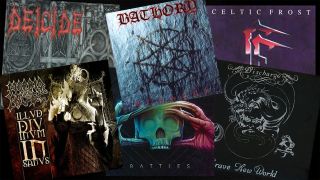Often in the various extreme metal scenes, the albums that everyone hates don’t always necessarily contain the worst music per se, but instead represent a sharp deviation from the style that first endeared a band to their fans – usually towards a more accessible, mainstream or fashionable sound and aesthetic. Thus did reasonably decent records like Carcass’ Swansong, Entombed’s Same Difference, Kreator’s Endorama and Cryptopsy’s The Unspoken King end up as the redheaded stepchildren in otherwise glittering and acclaimed discographies.
But which are those albums by reputable extreme bands where the most extreme thing about them is the extremity of their crappiness? We donned protective goggles and gauntlets to sift through vaults of gold in search of the crowning turds in the waterpipes.

Discharge – Grave New World (1986)
Discharge were a key motivator on the intensification of metal circa 1982, the Stoke punks flooring the jaws of every nascent thrasher with their bleak, blunt blasts of anti-war fury. Yet somehow, in the year of Reign In Blood and Master Of Puppets, Discharge thought their best bet was to throw their hat in with the Motley Crue wannabes. The iconoclastic Discharge sound was surgically removed from Discharge, replaced with Cal’s absurd falsetto squawk, overabundant pinch harmonics and big hair. There’s plenty of punk’s ‘fuck off’ attitude, but weirdly the ‘fuck offs’ were directed at their career, their fans and all notions of credibility.
Celtic Frost – Cold Lake (1988)
In the raging heat of the 80s thrash versus glam war, the Swiss avant-garde pioneers’ third LP was received by their fanbase as nothing less than a personal betrayal. Photos of the new-look Frosties in bouffant hairdos and pouty poses killed their career stone dead, before anyone even heard excruciatingly titled ditties like Dance Sleazy and Seduce Me Tonight. The songs weren’t all bad, but try telling Tom G Warrior that: “No matter how much I’m going to fail in the future, I will never sink that low again,” the frontman told DX Ferris in 2010, summating Cold Lake as “an utter piece of shit”.
Bathory – Octagon (1996)
Quorthon provided blueprints for about five metal subgenres in the 80s, progressing from cryptic black-thrashing death-punk to epic, folky Viking power-doom, leaving a trail of astonished acolytes frantically forming bands in his wake. By ‘96 though, the good ship Bathory was floundering on the rocks, Quorthon apparently resolving to rip off the thrash acts who’d ripped him off, resulting in this perfunctory, one-dimensional tinny din. The only influential thing here was the hollow, clanging drum-machine snare, presaging St Anger’s much-loathed ‘trash can’ drum sound. “A complete mess,” comments Primordial’s Nemtheanga in his podcast’s Bathory overview: “beyond the pale, a staggering fall from grace.”
Massacre – Promise (1996)
“While in the studio I realised that this material was shit and so during the post-production I quit,” combative vocalist Kam Lee told Voices From The Darkside zine in 2001, adding “This album sucks, and it ruined my career for a time! I hate it, and hope that every copy burst into flames of hellfire at this very moment.” A typically harsh, rococo assessment, but Promise is a hard record to defend; after waiting five years for a follow-up to the Floridian death metal pioneers’ epochal debut From Beyond, no Massacre fan was hoping for this pile of flat, dissonant, sub-Helmet staccato groove.
Abruptum – Vi Sonus Veris Nigrae Malitiaes (1996)
It’s not just a case of “whatever happened to tunes you can whistle?” Abruptum – usually operating as a double act with the names It and Evil – had already released two patience-testing LPs of avant-garde, improvised blackened noise, and these provide all the disturbing haunted asylum cacophony that your average loony could want. For this recording Evil is absent, leaving It alone in the studio (not a haunted asylum alas, but Peter Tägtgren’s highly sought-after Abyss facility), doing much the same low-energy droning, squealing and banging but to zero effect. We could all do this shit if only we could be arsed.
Destruction – The Least Successful Human Cannonball (1998)
The 90s were a difficult era for many 80s metalheads, but after ousting totemic frontman Schmier in 1990, German thrash pioneers Destruction plunged into the decade’s messiest identity crisis. Once among the world’s most uncompromising purveyors of breakneck intensity, Destruction’s fifth album was a confused hodgepodge of funk bass, dissonant skronk, cack-handed groove and aggravatingly loopy vocals, as desperately thrown together as the pathetic title, logo and sleeve, awkwardly attempting to nail a zeitgeist that was already out of date by ‘98. Schmier returned a year later, the barbaric thrash attack got back on track, and this exhaustingly annoying record was never mentioned again.
Deicide – In Torment In Hell (2001)
Sometimes a band doesn’t need to radically change styles to produce a limp turkey. Throughout the 90s Deicide were one of the world’s most powerful and successful death metal bands, yet somehow the Satanic Floridians seemed to be gravely afflicted by their own energy-sapping millennium bug. 2000’s Insineratehymn was mediocre enough, but In Torment… was pedestrian, low-grade stodge, the grudging material derisorily phoned in by sulking bandmates who by this point actively despised each other. Some perceived it as a ‘fuck you’ to a label no longer interested in death metal, but when DM was this tired and dull, who can blame them?
Six Feet Under – Graveyard Classics 2 (2004)
Six Feet Under’s first covers album was pointless enough; 12 classic rock, punk and heavy metal anthems rendered in lunkheaded stoner death metal style, ex-Cannibal Corpse frontman Chris Barnes’ subterranean monotone belch pushing versions of Purple Haze and Stepping Stone towards the self-parodic end of the novelty kitsch spectrum. Even so, Six Feet Under decided they hadn’t taken enough piss, so hit upon the dismally goofy, last-joint-of-the-night idea of covering AC/DC’s Back In Black LP, down-tuned and belched in its entirety. Its release date was not April 1. Somehow Six Feet Under remain on Metal Blade, and despite popular demand Graveyard Classics 5 will undoubtedly be along soon.
Morbid Angel – Illud Divinum Insanus (2011)
Audacity is a concept treasured in music, no doubt. However, when the mindless clodhopping stomp of Too Extreme! launched the eighth album by what was once the world’s most visionary death metal band, an entire fanbase were shouting at Morbid Angel to shove their audacity up their arses. After an eight-year hiatus, and welcoming back fan favourite frontman David Vincent, expectations were high, and although there are solid Morbid blasts here and there, they’re gracelessly rammed up against comically clunky experiments in all the wrong 90s alternative club night styles. With a fanbase universally dismayed, Mr Vincent’s second and final departure was inevitable.
In Flames – Battles (2016)
Few begrudged these Gothenburg stalwarts their concerted development away from 90s melodic death metal whizz-kiddery towards a more expansive and accessible sound in the 00s. But with In Flames back on Nuclear Blast and promising a more metallic focus after the high-gloss electro-alt-rock of 2014 major label release Siren Charms, Battles ended up the most egregious disappointment of their career. Reheated, restrained riffs sounded like they’d been generated by a mallcore riff algorithm, while the boyband choruses, millennial whoops, children’s choirs, and Anders’ petulant yelping and whining were never going to win back any disenfranchised headbangers frantically unstitching their Lunar Strain patches.


